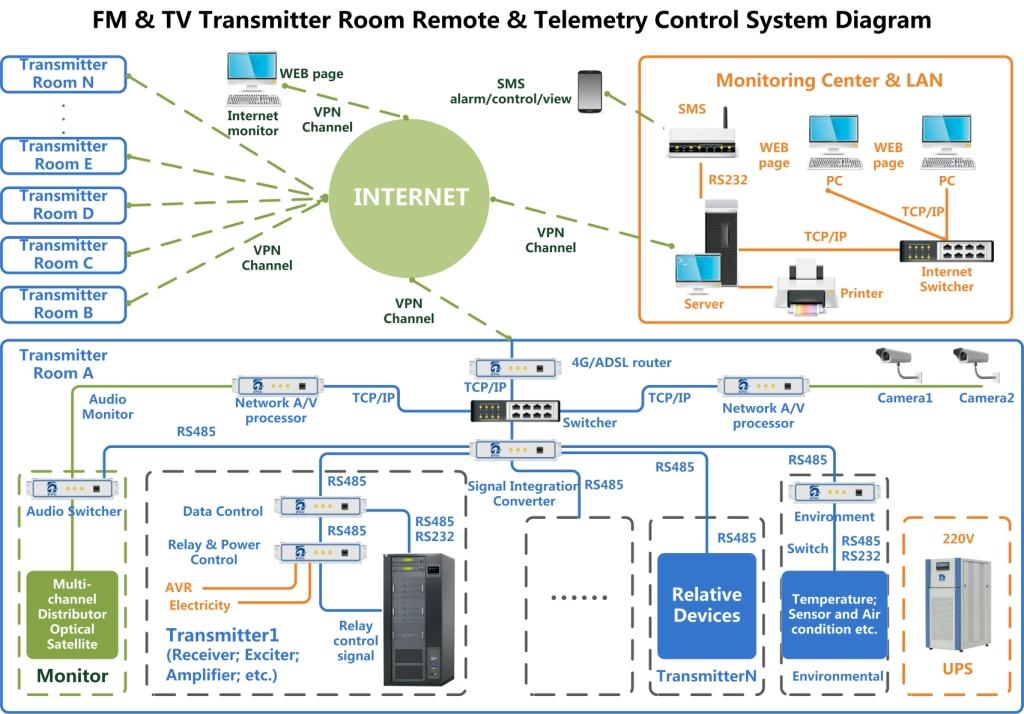Transmitter Remote Control Telemetry System
The launching station "unmanned, someone left behind" automatic broadcast monitoring system is based on scientific management concepts to replace the traditional "people-oriented" management mode. It uses reliable monitoring equipment to objectively and accurately evaluate the operation of the transmitter State and the current situation of the computer room, as far as possible to reduce the impact of human factors on the safe broadcast, so the basic design idea is to make the system as accurate, reliable, and rapid as possible.
In the overall design of the system, the database is used as the software platform of the entire system. All relevant information about the daily operation of the launching station and each management module are mutually used and interdependent with the link of the database.
With the rapid development of the emerging technology of computers, the progress of mankind in the field of control is also advancing by leaps and bounds. In the 1980s, a new control concept was put forward and put into practice. This is the distributed control system. The traditional control idea is the direct control theory, that is to say, the control of multiple objects is completed by a high-performance computer. Its shortcoming lies in the high concentration of risks. Once a problem occurs in any part of the computer, the entire monitoring system will be paralyzed. The idea of the distributed control system is precisely that the control is highly dispersed and the management is relatively centralized. The core of the system is the high-speed bus. We adopt the design concept of distributed control system in the system.
1. System composition:
The system consists of two parts: the monitoring center server (and its terminal PC in the local area network), the transmitter room (remote and local) data acquisition and control equipment. See Figure 1 below.

2. Function description:
1. Transmitting system is switched on and off immediately
2. The launch system is scheduled to switch on and off
3. Automatic (daily timing) switch on and off of the launch system
4. Analysis and control, automatic record storage and diagnostic alarm, etc.
5. Real-time acquisition, display and control of equipment operation in the transmitter room
6. Automatic alarm for launch system
7. Provide efficient historical data, real-time data and alarm data query and print reports
8. System management function
9. Automatic statistics of the operating time and accumulated operating time of each transmitter on the day
10. Authority and security management
11. Provide rich real-time and historical data running curve (chart)
System features and extended functions
1. Coaxial switching (automatic/manual switching between main and standby machines)
2. View the monitoring screen on the public network
3. Computer room monitoring and program monitoring
4. Mobile phone text message collection data and switch machine control
3. Monitoring system management software:
The main parameters of the exciter, power amplifier and satellite receiver in the FM transmitter, as well as the main parameters of the transmitting antenna feeder system can be monitored, controlled, and applauded locally or remotely. The maintenance personnel will be notified by SMS), system inquiries, real-time monitoring of the on-site image of the transmitting base station, and monitoring of the signal transmitted by the transmitter can also be carried out.
The monitoring system software is divided into: SCM and network version. The single-chip microcomputer can only monitor the transmitter and other equipment in the internal LAN or locally, and the connection methods are mostly limited; the network version can monitor remote transmitters, etc. on the Internet, which is very popular and convenient, and under authorized conditions, Log in to the network to browse and query the operating parameters of each base station transmitter. The connection method is mostly composite network.
4. Main technical indicators:
(1) The number of monitoring equipment ≥100 units
(2) Monitoring important parameters: (see the table below)
(3) Real-time image return frame number: 1-30 frames/sec adjustable
(4) Real-time sound return delay: <3 seconds
(5) Failure alarm delay time: <30 seconds
(6) Alarm accuracy rate: >99%
Monitoring includes: |
|
Control includes: |
Power amplifier and antenna part: |
|
automatic/manual switch on and off of various equipment: response cycle: 1-3 seconds |
Power amplifier forward power: accuracy: ±5%, sampling interval: adjustable from 1 to 30 seconds |
|
Exciter part: |
Power amplifier reflect power: accuracy: ±2%, sampling interval: adjustable from 1 to 30 seconds |
|
Power amplifier power adjustment: response period: 1-3 seconds |
Power amplifier working voltage: accuracy: ±1%, sampling interval: adjustable from 1 to 30 seconds |
|
Modulation adjustment: Response period: 1-3 seconds |
Power amplifier working current: accuracy: ±1%, sampling interval: adjustable from 1 to 30 seconds |
|
Delay amount adjustment: Response period: 1-3 seconds |
Power amplifier working temperature: accuracy: ±1%, sampling interval: adjustable from 1 to 30 seconds |
|
Pre-emphasis changes: Response period: 1-3 seconds |
Antenna VSWR: Precision: ±1%, sampling interval: adjustable from 1 to 30 seconds |
|
Audio input level adjustment: Response period: 1-3 seconds |
Exciter part: |
|
Center frequency change: Response period: 1-3 seconds |
Forward power: Accuracy: ±1%, sampling interval: adjustable from 1 to 30 seconds |
|
|
Reflect power: Accuracy: ±1%, sampling interval: adjustable from 1 to 30 seconds |
|
|
Audio input level: accuracy: ±1%, sampling interval: adjustable from 1 to 30 seconds |
|
|
Working frequency value: Accuracy: ±1%, sampling interval: adjustable from 1 to 30 seconds |
|
|
Power amplifier working temperature: accuracy: ±1%, sampling interval: adjustable from 1 to 30 seconds |
|
|
Power amplifier working voltage: accuracy: ±1%, sampling interval: adjustable from 1 to 30 seconds |
|
|
Power amplifier working current: accuracy: ±1%, sampling interval: adjustable from 1 to 30 seconds |
|
|
Other parts: |
|
|
Ambient temperature: accuracy: ±1%, sampling interval: adjustable from 1 to 30 seconds |
|
|
Environmental humidity: accuracy: ±1%, sampling interval: adjustable from 1 to 30 seconds |
|
|
Mains voltage: accuracy: ±1%, sampling interval: adjustable from 1 to 30 seconds |
|
|
Smoke alarm: Accuracy: 100%, sampling interval: adjustable from 1 to 30 seconds |
|
|
Human body infrared alarm: accuracy: 100%, sampling interval: adjustable from 1 to 30 seconds |
|
|


